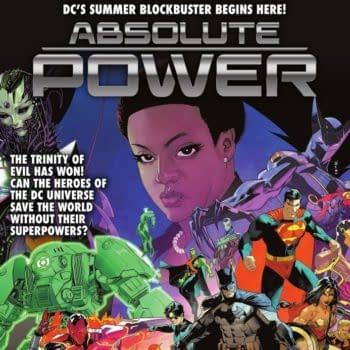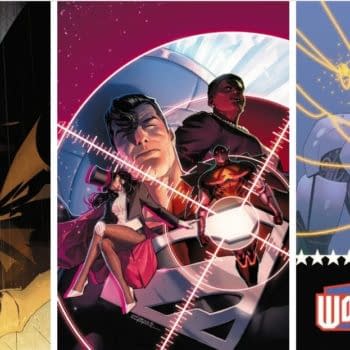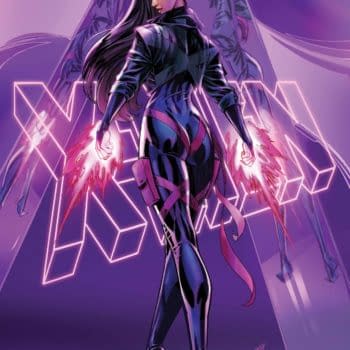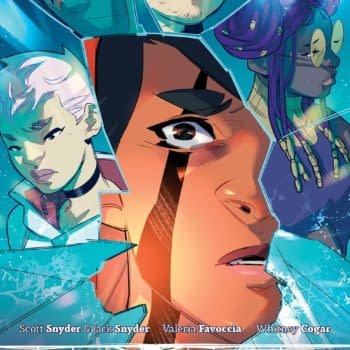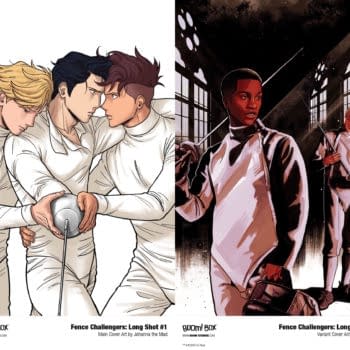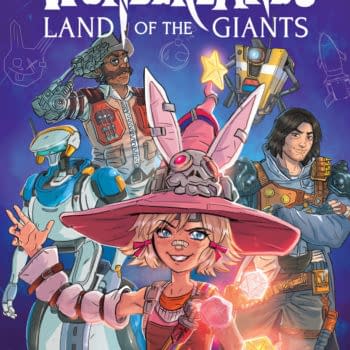Posted in: Comics | Tagged: Comics, entertainment, pack
The Leader Of The Pack
The Pack. Created, Written and Drawn by Paul Louise-Julie. The Pack is a Graphic Novel Series that follows a group of Egyptian Werewolves as the journey through a fantasy version of Ancient Africa.
Paul Louise-Julie writes,
Why do people make such a big deal about Mythologies ?
Maybe it's because they are the cornerstone of civilization? I mean, the greatest civilizations in human history incidentally had the most memorable mythologies that still inspire today. From Gilgamesh to the Greeks or China to the Mayans, all of these fascinating cultures had equally fascinating and complex mythologies. They provided a foundation upon which their art, language, architecture, clothing and philosophy were based. In a way, our mythologies define us. They're an artistic representation of what we hold dear.
But how does that translate into the modern world ? The great Professor Tolkien realized his beloved English people had no mythology – so he made one. Poof! Just like that, Middle Earth and the Silmarillion were born. Ever since, his work has been the benchmark for high fantasy in the western World. Americans have a peculiar relationship with mythology. Being a fairly young culture, they didn't have much to pull on. So what did they do? They created Superheroes! First conceived as childish tools of propaganda and humor, American Superheroes quickly grew to represent everything Americans admire and see in themselves. As their writing and depiction evolved, they became the equivalent of the Greek Titans or Mesopotamian Heroes. These stories constitute American Mythology.
So why the long tangent and what does that have to do with me? I'll get there. First, let me give you a little background. My family travelled a lot. So much that, by my 19th birthday, I had visited over 23 countries. My parents weren't rich, they just loved to do it. As did I. But after living in America, England, France and West Africa, you would think that all this uprooting would stress my childhood.
Honestly it was quite great (You develop an immunity to change after the first 10 countries). I would see fascinating places and exotic people and anytime I was bored I'd just draw. Did I forget to mention I was an artist ? Yeah well, because of that, anytime I didn't like my surroundings I just drew or sculpted my own. It became a habit and I became enamored by aspects of various cultures I liked – then infused them into my art. But the constant thing that captivated me about these cultures was their mythology. Each country was brimming with its share of modern or ancient fantasy and I was hooked.
But there was one problem. You see, as an American-born, French-Caribbean kid growing up in Europe; I couldn't fully connect with these stories. I mean – I loved them – but I could only identify so far. I knew I couldn't cosplay as Peter Parker, Legolas or even Harry Potter without feeling awkward. I was an interested tourist, nothing more. So I scoured the bookshelves of my collection (like Gandalf when he looks through scrolls in The Fellowship of the Ring). But the ironic truth was that I didn't feel represented in any of the worlds, books, comics, or movies I loved so much. Being an artist, I tried drawing "Black versions" of my favorite fantasies but to no avail. In the end, they looked like non-creative knockoffs like a blaxploitation movie without the soundtrack. What was I to do?
This is where the mythology came in. I thought: if I ever want to see more originally Black fantasy completely unrelated to racism or social commentary, I had to go to the roots. As it turned out, my parents did business in Africa and wanted to move there for awhile, so we did.
That year opened my eyes. First, I discovered the remnants of Ancient Empires that even the locals had forgotten. Second, I realized that my return-to-your-roots enthusiasm was not shared by most. In fact many Africans made a point of reminding me I was an outsider. It hurt but still I pressed on in my quest, learning as much as I could about the precolonial world of my ancestors.
Some Africans were nice though. One man in particular, Moktar. He was a Wolof man and took me to a secluded part of the city and into an enclosure where many men were dressed in bright colored clothes and turbans. We then went up some stairs to a dimly lit room with elaborate rugs on the floor. There was an old man seated on a rug. We sat down in front of him. Moktar spoke to him in Wolof then told me to memorize everything they were going to tell me. For the next few hours they told me the history of the entire region spanning back centuries. Tales of knights, and Realms, kings and heroes, demons and spirits. I had finally found my treasure. As we left Moktar told me no one outside of a special few had that privilege. Bu this honor did not come without a responsibility. He told me "Go back to where you come from and share what you learnt to our brothers and sisters. Tell them about their fathers". I never saw Moktar again but those words seared into my heart. I couldn't take this lightly. Nothing else mattered anymore. How was I going to do this ? Then it hit me. If I could create a mythology for the black diaspora based on the tales of our ancestors, i could redefine how we see ourselves – how the world sees us. If Tolkien could do it, so could I. For the next 5 years, I studied everything from ethnolinguistic blood groups, to Ancient African history, art and ruins. Then I coupled that with the knowledge Moktar had given me. I studied artistic objects from each African culture and broke them down into fractal codes. By doing this I was able to recreate fictional civilizations and cultures that looked genuinely African but that were purely fantasy. The result was I designed over 30 different civilizations. Now, the mythology. I used the stories Moktar told me the same way Tolkien used Norse and Saxon Mythology to right the Silmarillion. I found ways of weaving African versions of Dwarves, Elves, Dragons, Werewolves, and all sorts of things. After 5 years, I had done it. I had a mythology. But how to release it ? I decided to create a story that would go through my world the same way The Lord of the Rings went through Middle Earth. But instead of doing one linear story I decided to do a Comic Series with many arcs. The mythology I created would provide a detailed backdrop and enrich the environment. But I needed a unique concept. Something that had never been done before. Thus The Pack was created. A series following a group of Egyptian Werewolves. The first arc, the Egyptian Saga, chronicles their origin.
Now comes the part where I shake my tin cup. Ok, not really. But in order for this to work, people need to know about it. Word needs to spread. Even if you don't want to buy the comic, tell someone who does. Tumblr it, Instagram it, Like it, Tweet it – go for it. Truth is, without exposure, this special project dies a long, hard death. But if that exposure translates into sales,I have a shot of continuing this Self-Publishing adventure. I say "I" because it's just me: a one man factory. There's have no team behind me.
And to those worried that this might be a little too racially exclusive, don't be. Just because it is an "African Mythology" in no way means that you can't enjoy it as well. The same way that many Black Nerds are HUGE fans of European or Asian mythology, so can you be equally entertained by The Pack (I hope).
You can find Issue 1 of The Pack on iBooks and Kindle.
Like The Pack on Facebook.You can contact Paul Louise-Julie at mmonkee@outlook.com







